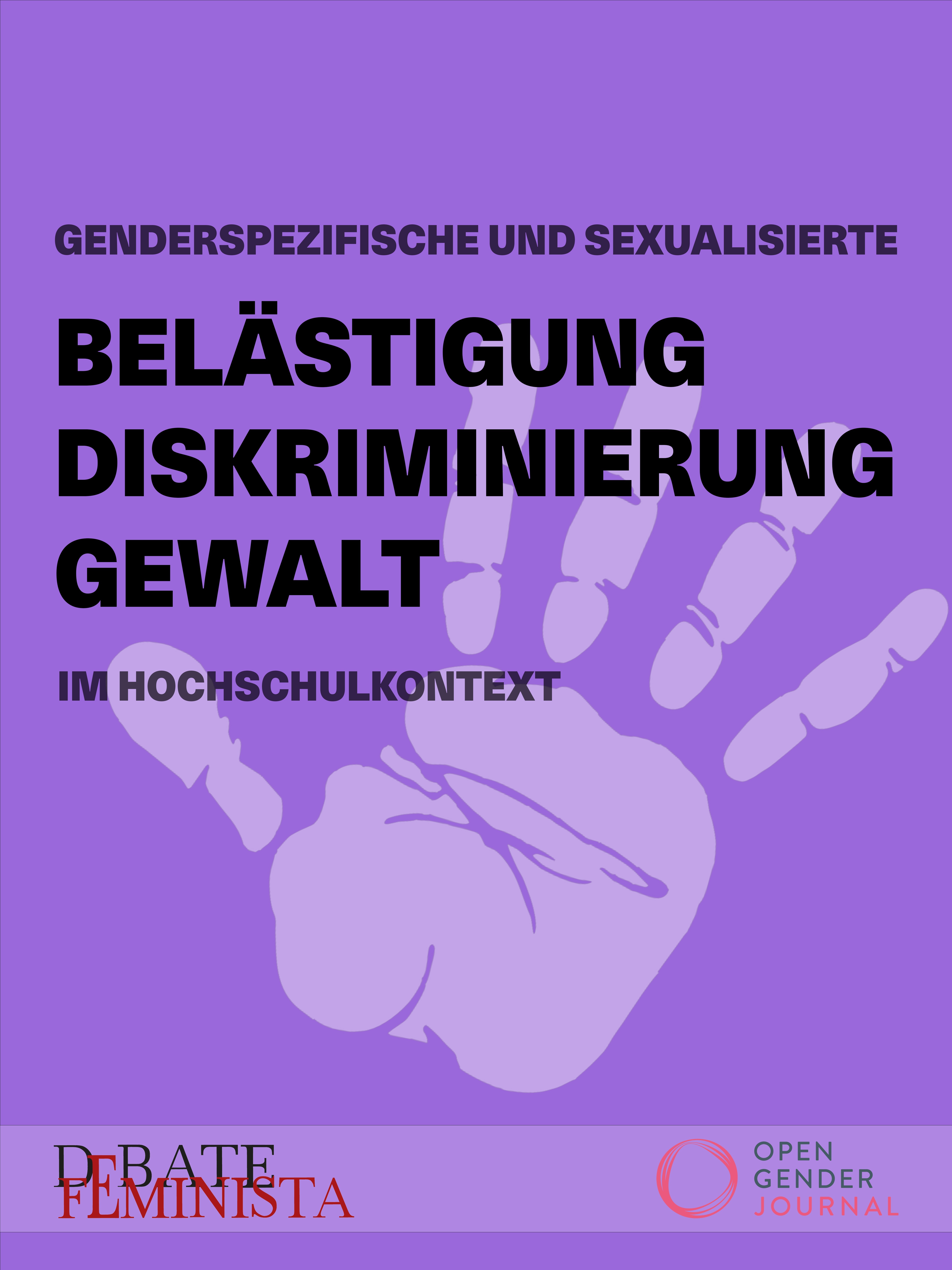Wann ist Forschung lokalisiert? Eurozentrismus in der Forschung über sexuelle/sexualisierte Gewalt in Hochschulen. Der Fall Indonesien
DOI:
https://doi.org/10.17169/ogj.2025.233Schlagworte:
Gewalt gegen Frauen, Eurozentrismus, Sexualisierte Gewalt, Hochschule, UniversitätAbstract
Die Forschung zu sexualisierter Gewalt in Hochschulen konzentriert sich bislang überwiegend auf Fälle aus den Vereinigten Staaten und dem Vereinigten Königreich. Diese werden oft als global übertragbare Best-Practice-Modelle dargestellt, während Forschung aus dem Globalen Süden als lokal spezifisch betrachtet wird. In diesem Artikel wird anhand einer Analyse der Metadaten – Titel, Zusammenfassungen und Schlüsselwörter – dreier führender Fachzeitschriften zur Gewaltforschung untersucht, wie eine solche geografische Einordnung erfolgt. Die Ergebnisse zeigen, dass Fälle aus dem Globalen Norden häufig ohne expliziten Länderbezug präsentiert werden, was zu ihrer Universalisierung beiträgt, während Fälle aus dem Globalen Süden klar gekennzeichnet und als kontextgebunden behandelt werden. Anhand des indonesischen Kontextes zeigt der Artikel auf, wie lokal verankerter Aktivismus und politische Entwicklungen die vorherrschenden akademischen Narrative herausfordern. Er argumentiert, dass akademische Publikationspraktiken zu epistemischer Gewalt beitragen, indem sie globale Hierarchien in der Wissensproduktion verstärken.
Literaturhinweise
Adjie, Moch. Fiqih Prawira (2020): ‘The Jakarta Post’ wins 2020 SOPA Award with ‘#NamaBaikKampus’ collaboration. In: The Jakarta Post. https://www.thejakartapost.com/news/2020/08/27/the-jakarta-post-wins-2020-sopa-award-with-namabaikkampus-collaboration.html (07.06.2025).
Amin, Samir (2009 [1988]): Eurocentrism. Modernity, religion, and democracy. A critique of Eurocentrism and culturalism. [2nd ed.] New York, NY: Monthly Review Press.
Anitha, Sundari (2020): From #MeToo to #HimToo in academia. New forms of feminist activism to challenge sexual violence. In: Marine, Susan B./Lewis, Ruth (Ed.): Collaborating for change. Transforming cultures to end gender-based violence in higher education. New York: Oxford University Press, 47–71. doi: 10.1093/oso/9780190071820.001.0001
Anitha, Sundari/Lewis, Ruth (Ed.) (2018): Gender based violence in university communities. Policy, prevention and educational initiatives. Policy Press. doi: 10.2307/j.ctv1fxh3v
Anitha, Sundari/Marine, Susan/Lewis, Ruth (2020): Feminist responses to sexual harassment in academia. Voice, solidarity and resistance through online activism. In: Journal of Gender-Based Violence 4 (1), 9–23. doi: 10.1332/239868019X15764492460286
Beittinger-Lee, Verena (2009): (Un)Civil society and political change in Indonesia. A contested arena. London/New York: Routledge.
Bhambra, Gurminder K. (2014): Connected sociologies. Theory for a global age series. London: Bloomsbury Academic. https://doi.org/10.5040/9781472544377
Bovill, Helen/Podpadec, Tessa (2023): What is currently understood about the impact of sexual violence activism for higher education student sexual violence survivors? In: Trauma, Violence, & Abuse 24 (4), 2227–2242. doi: 10.1177/15248380221093691
Braun, Tibor/Glänzel, Wolfgang/Schubert, András (2006): A Hirsch-type index for journals. In: Scientometrics 69 (1), 169–173. doi: 10.1007/s11192-006-0147-4
Brunner, Claudia (2020): Epistemische Gewalt. Wissen und Herrschaft in der kolonialen Moderne. Bielefeld, Germany: transcript. doi: 10.14361/9783839451311
Bull, Anna/Shannon, Erin (2024): How do institutional gender regimes affect formal reporting processes for sexual harassment? A qualitative study of UK higher education. In: Law & Policy 47 (1). doi: 10.1111/lapo.12255
Cahya, Gemma Holliani/Mariani, Evi (2019): Sexual abuse on campus. 174 survivors across Indonesia speak up. In: The Jakarta Post.
Cantalupo, Nancy Chi (2010): How should colleges and universities respond to peer sexual violence on campus? What the current legal environment tells us. In: NASPA Journal About Women in Higher Education 3 (1), 52–87. doi: 10.2202/1940-7890.1044
Cantor, David/Fisher, Bonnie/Thomas, Reanne/Herbison, Randy/Madden, Kristin/Mann, Edward/Kalmanovich, Yevgeniy/Hershey-Arista, Molly/Harding, Lee/Collins, Laura (2024): Report on the 2024 higher education sexual misconduct and awareness survey. (Aggregate Report). Westat.
Castro Torres, Andrés F./Alburez-Gutierrez, Diego (2022): North and South. Naming practices and the hidden dimension of global disparities in knowledge production. In: Proceedings of the National Academy of Sciences 119 (10). doi: 10.1073/pnas.2119373119
Chakrabarty, Dipesh (2000): Provincializing Europe. Postcolonial thought and historical difference. [New edition]. Princeton: Princeton University Press.
Chakrabarty, Dipesh (2008): 2. In defense of provincializing Europe: A response to Carola Dietze. In: History and Theory 47 (1), 85–96. doi: 10.1111/j.1468-2303.2008.00438.x
Childress, Saltanat (2018): “Plates and dishes smash; married couples clash”. Cultural and social barriers to help-seeking among women domestic violence survivors in Kyrgyzstan. In: Violence Against Women 24 (7), 775–797. doi: 10.1177/1077801217722239
Connell, Raewyn (2007): Southern theory. The global dynamics of knowledge in social science. London/New York: Routledge. doi: 10.4324/9781003117346
Correia, Mariama (2023): Brazilian state deputy says she was sexually assaulted by Boaventura de Sousa Santos. Agência Pública. https://apublica.org/2023/04/brazilian-state-deputy-says-she-was-sexually-assaulted-by-boaventura-de-sousa-santos/ (24.02.2025).
Dibley, Thushara/Ford, Michele (2019): Introduction. Social movements and democratization in Indonesia. In: Dibley, Thushara/Ford, Michele (Ed.): Activists in transition. Progressive politics in democratic Indonesia. Ithaca/London: Cornell University Press, 1–21. https://doi.org/10.7591/9781501742491-003
Dietze, Carola (2008): Toward a history on equal terms: A discussion of Provincializing Europe. In: History and Theory 47 (1), 69–84. doi: 10.1111/j.1468-2303.2008.00437.x
Fair, C. Christine (2017): #HimToo. A reckoning. BuzzFeed. https://www.buzzfeed.com/christinefair/himtoo-a-reckoning (14.04.2025).
Goodmark, Leigh (2015): Exporting without license. The American attempt to end intimate partner abuse worldwide. In: Goel, Rashmi/Goodmark, Leigh (Ed.): Comparative perspectives on gender violence. Lessons from efforts worldwide. Oxford/New York: Oxford University Press. https://doi.org/10.1093/acprof:oso/9780199346578.003.0001
Guzman, Chad de (2022): After a teacher raped 13 girls, Indonesia finally passed sexual violence reform. Time. https://time.com/6166853/indonesia-sexual-violence-law/ (09.01.2023).
Hagemann-White, Carol (2016): Grundbegriffe und Fragen der Ethik bei der Forschung über Gewalt im Geschlechterverhältnis. In: Helfferich, Cornelia/Kavemann, Barbara/Kindler, Heinz (Ed.): Forschungsmanual Gewalt. Grundlagen der empirischen Erhebung von Gewalt in Paarbeziehungen und sexualisierter Gewalt. Wiesbaden: Springer Fachmedien, 13–31. doi: 10.1007/978-3-658-06294-1_2
Haraway, Donna (1988): Situated knowledges. The science question in feminism and the privilege of partial perspective. In: Feminist Studies 14 (3), 575. doi: 10.2307/3178066
Hervías Parejo, Vanesa (2023): Sexual and sexist violence in the universities of Southern Spain. In: Journal of Interpersonal Violence 38 (11–12), 7485–7509. doi: 10.1177/08862605221145716
HopeHelps Network (2023): HopeHelps Network (@hopehelpsnet) • Instagram photos and videos. https://www.instagram.com/hopehelpsnet/ (12.01.2023).
Jackson, Carolyn/Sundaram, Vanita (2020): Lad culture in higher education. Sexism, sexual harassment and violence. Routledge. https://doi.org/10.4324/9780203702901
Joanpere, Mar/Burgués-Freitas, Ana/Soler, Marta/Aiello, Emilia (2022): History of MeToo university movement in Spain. In: Social and Education History 11 (2). doi: 10.17583/hse.10545
Klein, Renata (2018): Sexual violence on US college campuses. History and challenges. In: Anitha, Sundari/Lewis, Ruth (Ed.): Gender based violence in university communities. Bristol: Policy Press, 63–82. https://doi.org/10.2307/j.ctv1fxh3v.8
Knorr, Lina (2020): Claudia Brunner. Epistemische Gewalt. Wissen und Herrschaft in der kolonialen Moderne. In: International Quarterly for Asian Studies 51 (3–4), 201–203 doi: 10.11588/IQAS.2020.3-4.13628
Krippendorff, Klaus (2019): Content analysis. An introduction to its methodology. SAGE Publications. doi: 10.4135/9781071878781
Kusman, Airlangga Pribadi (2022): The new Criminal Code. Authoritarianism disguised as decolonisation. Indonesia at Melbourne. https://indonesiaatmelbourne.unimelb.edu.au/the-new-criminal-code-authoritarianism-disguised-as-decolonisation/ (21.02.2025).
Lipinsky, Anke/Schredl, Claudia/Baumann, Horst/Humbert, Anne Laure/Tanwar, Jagriti (2022): Gender-based violence and its consequences in European academia. Summary results from the UniSAFE survey. (No. 01006261). UniSAFE.
Lyons, Minna/Brewer, Gayle/Bogle, Iona/Castro Caicedo, Jorge/Gaspar, Monic/Ghayda, Carissa/Huelin, Maya/Wei Liang, Tan/Centifanti, Luna (2022): Barriers to bystander intervention in sexual harassment. The Dark Triad and rape myth acceptance in Indonesia, Singapore, and United Kingdom. In: Journal of Interpersonal Violence 37 (23–24), NP22151–NP22174. doi: 10.1177/08862605211072150
Martin, Patricia Yancey/Hummer, Robert A. (1989): Fraternities and rape on campus. In: Gender & Society 3 (4), 457–473. doi: 10.1177/089124389003004004
Maryani, Eni/Janitra, Preciosa Alnashava/Ratmita, Reksa Anggia (2021): @Indonesiatanpafeminis.id as a challenge of feminist movement in virtual space. In: Frontiers in Sociology 6. doi: 10.3389/fsoc.2021.668840
Ministeri Pendidikan, Kebudayaan, Riset, dan Teknologi, Republik Indonesia (2021): Permendikbud nomor 30 tahun 2021 tentang pencegahan dan penanganan kekerasan seksual di lingkungan perguruan tinggi. Nomor 30 Tahun 2021. https://peraturan.bpk.go.id/Details/188450/permendikbud-no-30-tahun-2021 (07.06.2025)
Muryanto, Bambang/Mariani, Evi (2019): Sexual assault survivor’s long battle to find justice in UGM. In: The Jakarta Post. https://www.thejakartapost.com/news/2019/02/08/sexual-assault-survivors-long-battle-to-find-justice-in-ugm.html (07.06.2025).
Muryanto, Bambang (2018): Antisexual-assault movement ‘#kitaAGNI’ gains traction. In: The Jakarta Post. https://www.thejakartapost.com/news/2018/11/09/antisexual-assault-movement-kitaagni-gains-traction.html (07.062025).
Nieder, Christina/Muck, Christoph/Kärtner, Joscha (2019): Sexual violence against women in India. Daily life and coping strategies of young women in Delhi. In: Violence Against Women 25 (14), 1717–1738. doi: 10.1177/1077801218824056
Nyman, Mikaela (2006): Democratising Indonesia. The challenges of civil society in the era of Reformasi. Copenhagen: NIAS Press.
Page, Tiffany/Bull, Anna/Chapman, Emma (2019): Making power visible. “Slow activism” to address staff sexual misconduct in higher education. In: Violence Against Women 25 (11), 1309–1330. doi: 10.1177/1077801219844606
Pannen, Paulina (2018): Higher education systems and institutions, Indonesia. In: Encyclopedia of international higher education systems and institutions. Dordrecht: Springer Netherlands, 1–10. doi: 10.1007/978-94-017-9553-1_581-1
Pantelmann, Heike/Blackmore, Sabine (Ed.) (2023): Sexualisierte Belästigung, Diskriminierung und Gewalt im Hochschulkontext. Herausforderungen, Umgang und Prävention. Wiesbaden: Springer. https://doi.org/10.1007/978-3-658-40467-3
Pantelmann, Heike/Wälty, Tanja (2022): The hidden problem. Sexual harassment and violence in German higher education. In: Striebing, Clemens/Müller, Jörg/Schraudner, Martina (Ed.): Diversity and discrimination in research organizations. Bingley: Emerald Publishing, 209–234. doi: 10.1108/978-1-80117-956-020221005
Phipps, Alison (2021): Tackling sexual harassment and violence in universities. Seven lessons from the UK. Ali Phipps. https://phipps.space/2021/02/05/seven-lessons/ (14.12.2022).
Quijano, Aníbal (2000): Coloniality of power and Eurocentrism in Latin America. In: International Sociology 15 (2), 215–232. doi: 10.1177/0268580900015002005
Rege, Sharmila (2016): Feminism. Beyond global and local [Lecture].
Rege, Sharmila (2006): Writing caste, writing gender. Reading Dalit women’s testimonios. New Delhi: Zubaan.
Ruitang, Boby Andika (2017): Indonesia, it’s time to abandon your Ospek tradition. Medium. https://medium.com/@bobyandika/indonesia-its-time-to-abandon-your-ospek-tradition-74f6a5091bdf (03.052025).
Sage Journals (n.d.a): Journal of Interpersonal Violence. Journal overview and metrics. https://journals.sagepub.com/overview-metric/JIV? (30.01.2025).
Sage Journals (n.d.b): Violence Against Women. Journal overview and metrics. https://journals.sagepub.com/overview-metric/VAW? (29.01.2025).
Santos, Boaventura de Sousa (2014): Epistemologies of the South. Justice against epistemicide. London/New York: Routledge. doi: 10.4324/9781315634876
Sastramidjaja, Yatun Maryati (2016): Playing politics: Power, memory, and agency in the making of the Indonesia student movement. Amsterdam Institute for Social Science Research. University of Amsterdam.
Scopus (2024): How do author keywords and Indexed keywords work? Scopus. Access and use support center. https://service.elsevier.com/app/answers/detail/a_id/21730/supporthub/scopus/kw/Index+Keywords/ (18.02.2025).
Spivak, Gayatri Chakravorty (1994): Can the subaltern speak? In: Colonial discourse and post-colonial theory. A reader. New York: Columbia University Press, 66–111.
Springer Publishing Connect (n.d.): Violence and victims. https://connect.springerpub.com/content/sgrvv (30.01.2025).
Stoll, Laurie Cooper/Lilley, Terry Glenn/Pinter, Kelly (2017): Gender-blind sexism and rape myth acceptance. In: Violence Against Women 23 (1), 28–45. doi: 10.1177/1077801216636239
Towl, Graham (2016): Tackling sexual violence at UK universities. A case study. In: Contemporary Social Science 11 (4), 432–437. doi: 10.1080/21582041.2016.1260764
Treat, Teresa A./Corbin, William R./Papova, Anna/Richner, Kailey/Craney, Raquel/Fromme, Kim (2021): Selection and socialization accounts of the relation between fraternity membership and sexual aggression. In: Psychology of Addictive Behaviors. Journal of the Society of Psychologists in Addictive Behaviors 35 (3), 337–350. doi: 10.1037/adb0000662
UNFPA (2017): Key findings of 2016 VAW (Violence Against Women) survey in Indonesia. https://indonesia.unfpa.org/en/publications/key-findings-2016-vaw-violence-against-women-survey-indonesia-0 (07.062025).
Viane, Lieselotte/Laranjeiro, Catarina/Tom, Miye Nadya (2023): The walls spoke when no one else would. Autoethnographic notes on sexual-power gatekeeping within avant-garde academia. In: Pritchard, Erin/Edwards, Delyth (Ed.): Sexual misconduct in academia. Informing an ethics of care in the university. London: Routledge, 208–225. doi: 10.4324/9781003289944
Vice (2018): A campus sex assault victim is calling for an end to systemic rape culture in Indonesia. https://www.vice.com/en/article/a-campus-sex-assault-victim-is-calling-for-an-end-to-systemic-rape-culture-in-indonesia/ (29.04.2025).
Wahyuni, Sri/Mariani, Evi (2018): ‘Victim blaming’ in latest Indonesian uni sex abuse case angers thousands. In: Asian Pacific Report. https://asiapacificreport.nz/2018/11/11/victim-blaming-in-latest-indonesian-uni-sex-abuse-case-angers-thousands/ (29.04.2025).
Wallerstein, Immanuel (1997): Eurocentrism and its avatars. The dilemmas of social science. In: New Left Review (I/226), 93–107.
Wooten, Sara Carrigan/Mitchell, Roland W. (Ed.) (2016): The crisis of campus sexual violence. Critical perspectives on prevention and response. Routledge. https://doi.org/10.4324/9781315725604

Downloads
Veröffentlicht
Zitationsvorschlag
Ausgabe
Rubrik
Kategorien
Lizenz
Copyright (c) 2025 Lina Knorr

Dieses Werk steht unter der Lizenz Creative Commons Namensnennung 4.0 International.
Alle Beiträge in Open Gender Journal erscheinen unter der Lizenz Creative Commons Namensnennung 4.0 International (CC BY 4.0). Die entsprechenden Texte dürfen Sie unter den Bedingungen der Lizenz frei nutzen (Lizenzvertrag, allgemeinverständliche Fassung). Es findet keine exklusive Übertragung von Verwertungsrechten („copyright transfer“) an die Zeitschrift statt. Open Gender Journal stellt den Autor*innen keinerlei Kosten für die Publikation (sogenannte Article Processing Charges, APC) oder die Einreichung (sog. Submission Charges) in Rechnung. Die Autor_innen werden ermutigt, ihre Beiträge auch an anderen Orten, z.B. in Repositorien, einzustellen.












